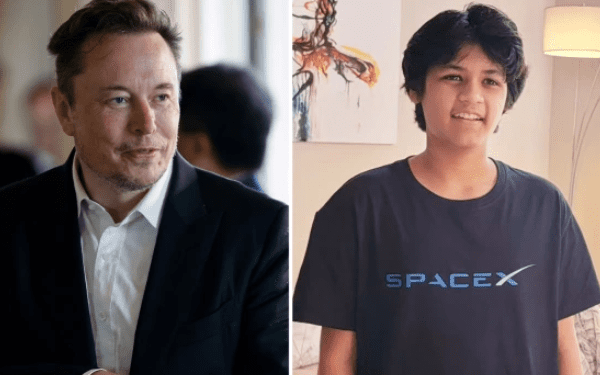Elon Musk, renowned for his unconventional thinking and risk-taking, has made waves in the headlines with his recent hiring of a 14-year-old prodigy as a software engineer.
Recognizing the exceptional skills and potential impact of this young talent, Musk believes that bringing in fresh perspectives and diverse skill sets will enable his team to continue pushing the boundaries of what is possible.
Read also: Elon Musk incorporates Twitter Inc into X Corp
Kairan Quazi’s Remarkable Journey to Success
Kairan Quazi, a 14-year-old prodigy, has already showcased extraordinary skills in the field of software engineering. Having completed an internship at Intel, he is set to graduate from Santa Clara University in California later this month with a Bachelor’s degree in Mathematics and Computer Science and Engineering.
Quazi’s rapid ascent in academia and his exceptional achievements have earned him the recognition of being a “genius” and a “wonder kid” by local media.
Embracing Unconventional Talent
Elon Musk has long been known for his willingness to take risks and think outside the box. By hiring a young individual like Quazi, Musk aims to tap into the immense potential of unconventional talent.
He believes that by embracing fresh perspectives and diverse skill sets, his team will be able to drive innovation to new heights and challenge established norms.
This decision reflects Musk’s commitment to fostering a work environment that values talent over arbitrary measures such as age.
A Role in Building the Future of Internet Connectivity
Quazi will join SpaceX’s Starlink team, which is currently developing the world’s largest satellite internet network. As a software engineer, he will contribute to this groundbreaking project that aims to revolutionize global connectivity.
Quazi enthusiastically announced his new role on LinkedIn, declaring SpaceX as “the coolest company on the planet” and highlighting their progressive approach to talent selection.
Controversy and Discrimination
Quazi’s LinkedIn profile, where he initially shared his excitement about joining SpaceX, was subsequently removed due to the platform’s age restrictions. As per LinkedIn’s policy, users must be at least 16 years old.
Quazi responded to this ban on Instagram, criticizing the “illogical, primitive nonsense” of his removal, which he viewed as a form of discrimination based on age.
Embracing Youthful Potential for Innovation and Disruption
Elon Musk’s recent decision to hire a 14-year-old prodigy as a software engineer is not the only instance where companies have recognized the remarkable abilities of young talents.
Microsoft, a global technology leader, has a long history of hiring young talents. The company established the “Microsoft Student Accelerator” program, which recruits teenagers with exceptional technical skills and offers them internships and mentorship opportunities. This initiative has allowed young innovators to contribute to groundbreaking projects and technologies, such as artificial intelligence and cloud computing, shaping the future of Microsoft and the tech industry as a whole.
Google, known for its forward-thinking culture, has also embraced the hiring of young talents. The company has a dedicated program called “Google Code-in” that focuses on engaging pre-university students in open-source development. By identifying prodigies at an early stage, Google provides them with exposure to real-world coding projects, fostering their growth and providing opportunities for future employment. This approach not only benefits young talents but also infuses Google with fresh perspectives and innovative ideas.
Apple has recognized the potential of young developers and entrepreneurs through initiatives such as the “Apple Developer Academy.” This program offers aspiring app developers, some as young as 16 years old, the chance to receive training and mentorship from industry experts. By empowering these young minds, Apple encourages them to create groundbreaking applications that shape the app ecosystem. Several successful apps and startups have emerged from this program, showcasing the impact of nurturing young talent in the tech industry.
Beyond established tech giants, startups have also played a significant role in embracing young talent. Many youth-led ventures disrupt traditional industries with their fresh perspectives and innovative approaches.
Examples include companies like Snap Inc., the parent company of Snapchat, which was founded by Evan Spiegel while he was still in his early twenties. These startups showcase how young entrepreneurs can challenge the status quo, redefine industries, and inspire a new generation of innovators.
